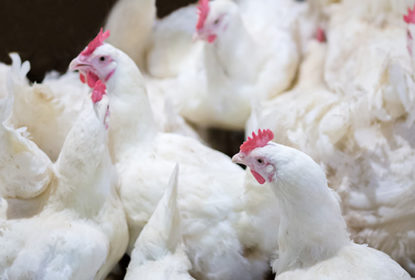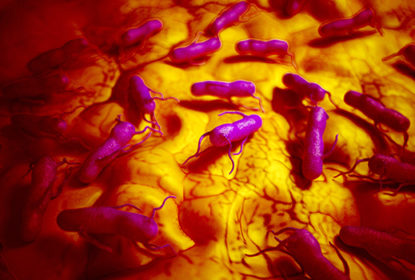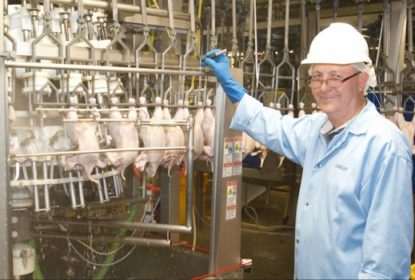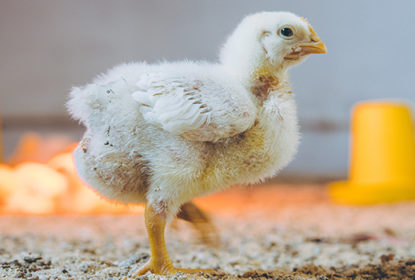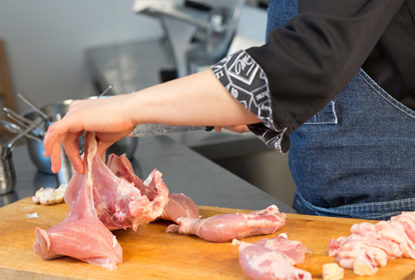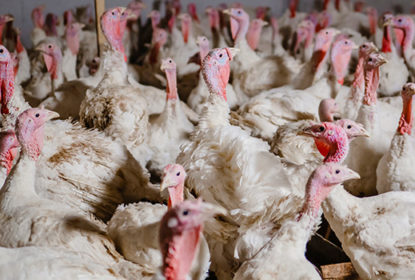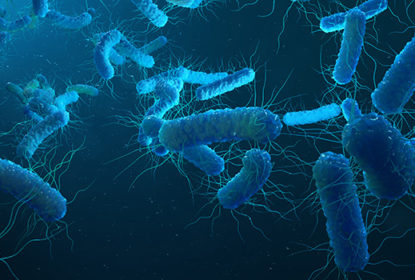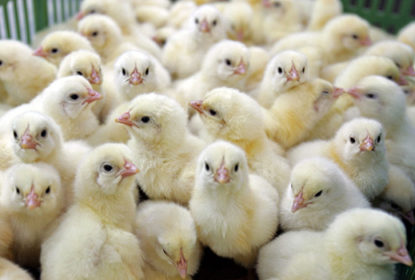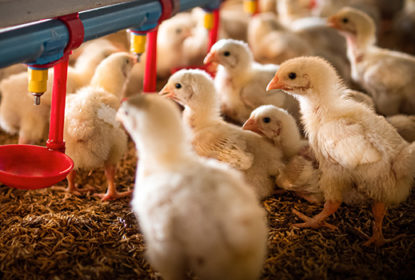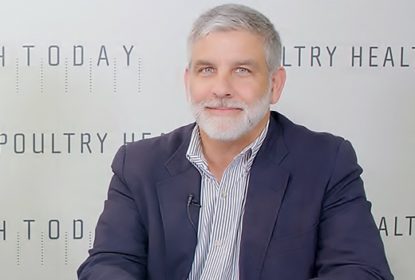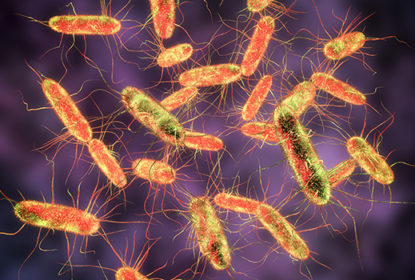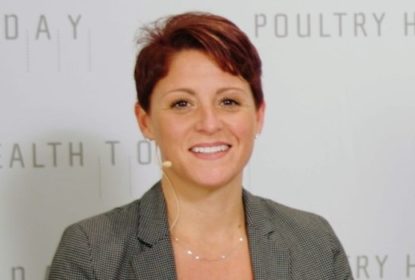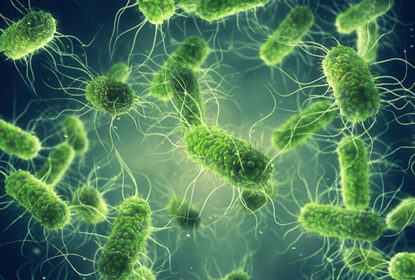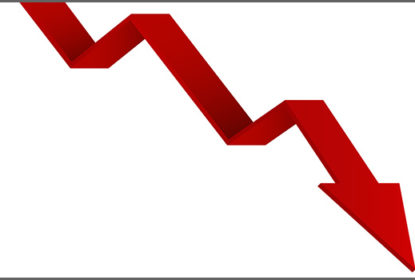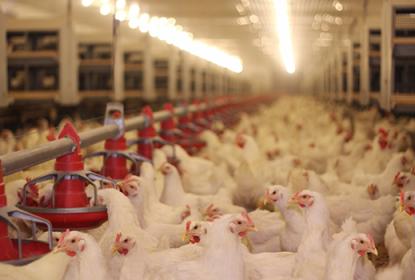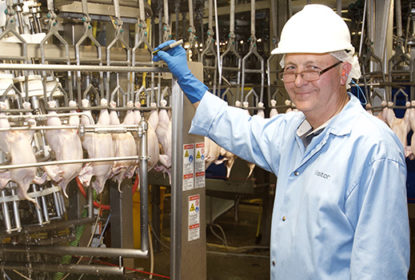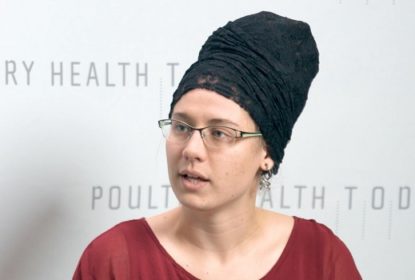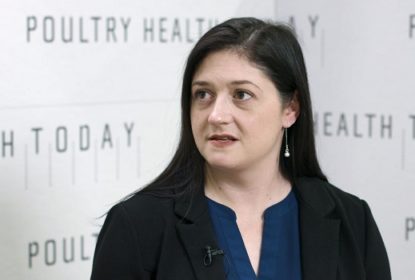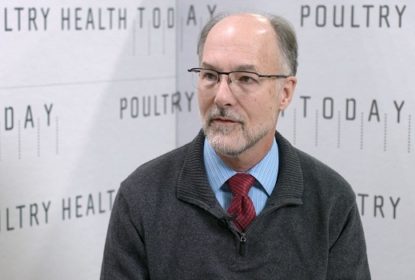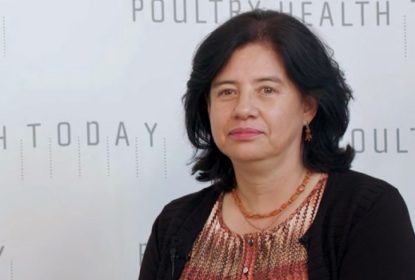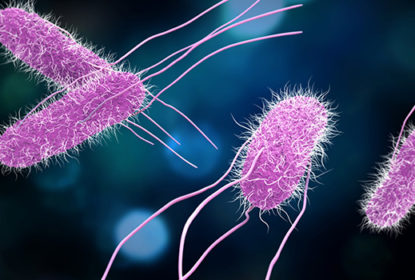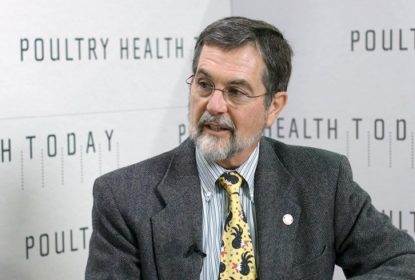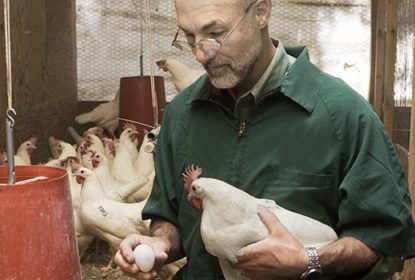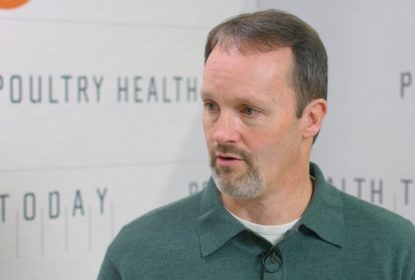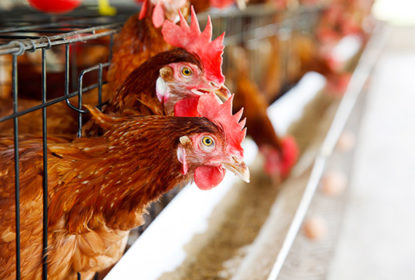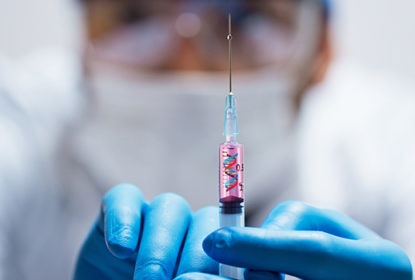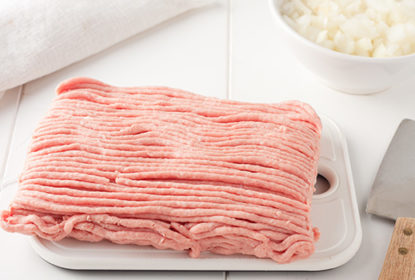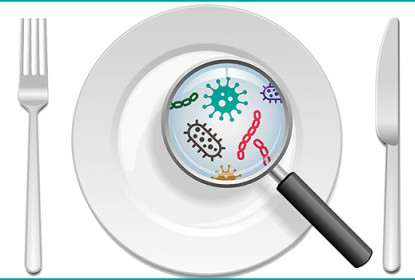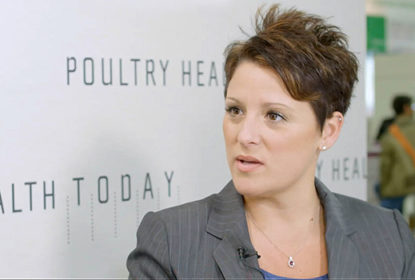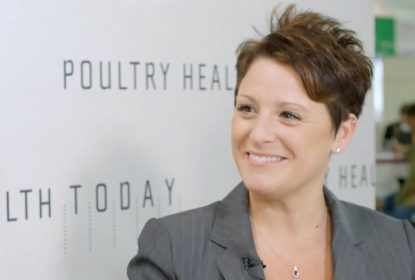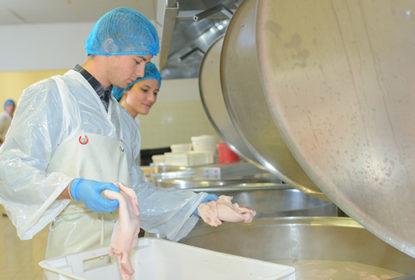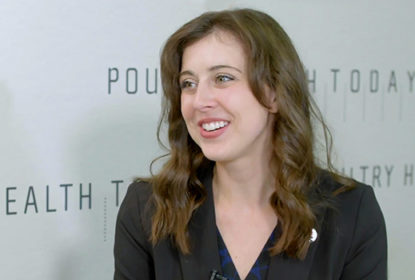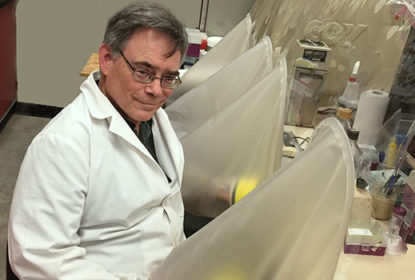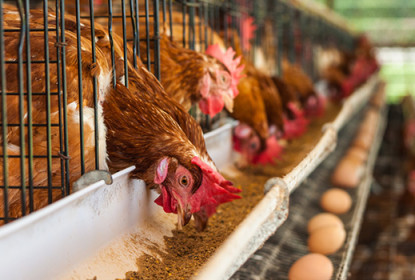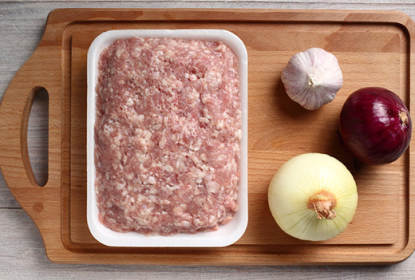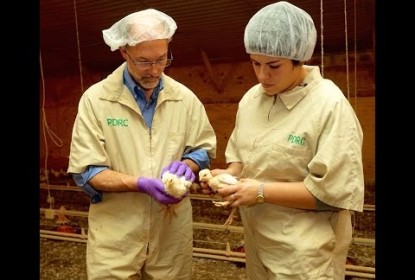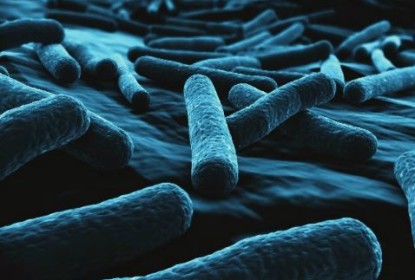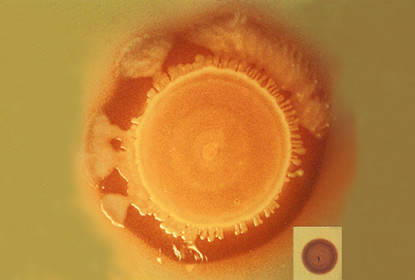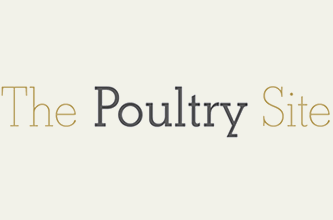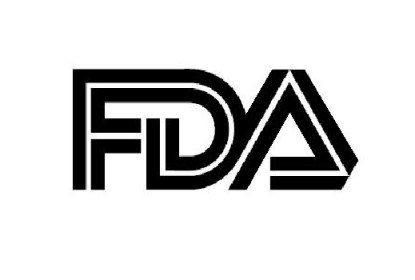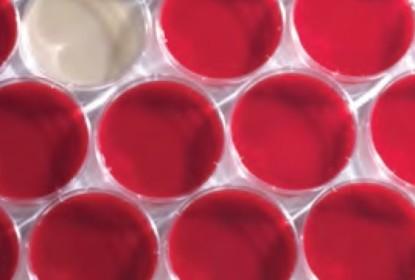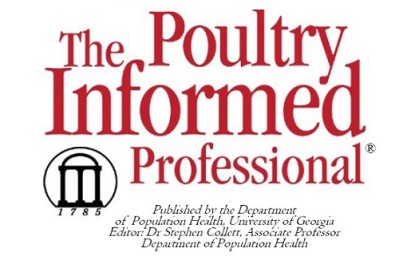Tag Archive: FSIS, salmonella, USDA
... Pre-harvest controls vital to tackling Salmonella prevalence
Dec 15, 2022Jennifer GrullonComments Off on Pre-harvest controls vital to tackling Salmonella prevalence
Producers must voluntarily adopt pre-harvest interventions to help reduce the prevalence of Salmonella in US poultry products, according to experts. Read about the USDA proposed regulations.... Study exposes Salmonella-contamination risks of integrated broiler production
Nov 22, 2022Jennifer GrullonComments Off on Study exposes Salmonella-contamination risks of integrated broiler production
Integrated broiler producers in Europe pose a risk of transmitting and maintaining clones of Salmonella throughout the production chain, according to researchers in Spain.... Too few aware of FSIS guidelines about live Salmonella vaccines
Nov 22, 2022Jennifer GrullonComments Off on Too few aware of FSIS guidelines about live Salmonella vaccines
By Douglas L. Fulnechek, DVM, Senior Public Health Veterinarian, Zoetis... Reusing poultry litter may reduce antibiotic-resistant Salmonella
Oct 20, 2022Jennifer GrullonComments Off on Reusing poultry litter may reduce antibiotic-resistant Salmonella
Reusing poultry litter can help boost bird health and may help prevent the transfer of antibiotic-resistant Salmonella, scientists have discovered.... No consensus on future success of Salmonella control for poultry industry
Oct 05, 2022Jennifer GrullonComments Off on No consensus on future success of Salmonella control for poultry industry
Opinions about the poultry industry’s future success in controlling Salmonella differ widely, judging by comments from panelists at a food-safety roundtable.
Food Safety, Global TOP NEWS, Interviews, News, PHT GLOBAL, PHT US, Podcast, Research, TOP NEWS, Videos
... Study highlights risk of high Salmonella exposure, more persistent serotypes
Sep 10, 2022Jennifer GrullonComments Off on Study highlights risk of high Salmonella exposure, more persistent serotypes
Feed conversion takes a bigger hit in birds with higher Salmonella exposure, while Salmonella Reading outlasts other serotypes through the grow-out period, suggests new work from the University of...... Turkey-farm study finds Salmonella Infantis prevalent
Apr 19, 2022Jennifer GrullonComments Off on Turkey-farm study finds Salmonella Infantis prevalent
Research studying Salmonella across one turkey producer’s farms found Salmonella Infantis to be by far the dominant serotype.... Lowering Salmonella load at processing requires company-wide effort initiated from the top
Dec 08, 2021Jennifer GrullonComments Off on Lowering Salmonella load at processing requires company-wide effort initiated from the top
Lowering the load of Salmonella going into the processing plant requires a company-wide effort initiated from the top, panelists advised at a roundtable on food safety.... Poulvac® ST cross-protects against different Salmonella serotypes
Oct 07, 2021Jennifer GrullonComments Off on Poulvac® ST cross-protects against different Salmonella serotypes
Salmonella vaccination is a vital part of an integrated approach to reducing the Salmonella load during the broiler life cycle.... Direct-fed microbials can impact Salmonella vaccine efficacy
Sep 22, 2021Jennifer GrullonComments Off on Direct-fed microbials can impact Salmonella vaccine efficacy
Some direct-fed microbial additives with live cultures have been found to impact the efficacy of modified-live vaccines.... Salmonella control in hatchery, second processing require special attention
Aug 09, 2021Jennifer GrullonComments Off on Salmonella control in hatchery, second processing require special attention
Interventions for Salmonella control throughout the production process are essential, but special attention at the hatchery and during second processing at the plant are critical to success,...
Antibiotic-free, Biosecurity, Food Safety, Global TOP NEWS, Interviews, News, PHT GLOBAL, PHT US, Podcast, Research, TOP NEWS, Videos
... Better management, biosecurity could mean lower Salmonella levels in NAE farms
Jul 03, 2021Jennifer GrullonComments Off on Better management, biosecurity could mean lower Salmonella levels in NAE farms
New research has suggested that Salmonella levels in no-antibiotics-ever (NAE) poultry systems could be lower than those on conventional broiler farms.
Food Safety, Global TOP NEWS, Gut Health, Interviews, News, PHT GLOBAL, PHT US, Podcast, Sustainability, TOP NEWS, Videos
... Right skills critical to managing increases in Salmonella, coccidiosis associated with cage-free egg production
Jun 23, 2021Jennifer GrullonComments Off on Right skills critical to managing increases in Salmonella, coccidiosis associated with cage-free egg production
Producers making the switch to cage-free egg production need to ensure they are properly prepared for managing potential increases in Salmonella and other health challenges.... Poultry companies using variety of interventions to improve food safety
Jun 09, 2021Jennifer GrullonComments Off on Poultry companies using variety of interventions to improve food safety
Poultry companies are using a variety of interventions to curb Salmonella and improve food safety, even though it’s not always easy to justify the cost of each, panelists said at a food-safety...... Testing mixed control approaches important in controlling Salmonella in broilers
Apr 26, 2021Jennifer GrullonComments Off on Testing mixed control approaches important in controlling Salmonella in broilers
Commercial broiler farms often employ a multi-faceted approach in tackling Salmonella, but testing different combinations of control options together on a small scale before they are rolled out...... Good gut health can help minimize Salmonella in broilers
Dec 17, 2020Jennifer GrullonComments Off on Good gut health can help minimize Salmonella in broilers
TOOLBOX, Issue 14: An interview with Manuel Da Costa, DVM, PhD, Associate Director, Outcomes Research, Zoetis... Now more than ever, vaccination is critical for managing Salmonella in layer flocks
Nov 28, 2020Jennifer GrullonComments Off on Now more than ever, vaccination is critical for managing Salmonella in layer flocks
TOOLBOX, Issue 22: An interview with Kalen Cookson, DVM, MAM, Director of Clinical Research, Zoetis... Tailoring control measures key to managing Salmonella
Aug 10, 2020Jennifer GrullonComments Off on Tailoring control measures key to managing Salmonella
Producers need to take more care in matching Salmonella vaccines for broiler breeders to the strain of the pathogen challenging their flocks.... Live Salmonella vaccines, some DFMs may not mix
Jul 20, 2020Jennifer GrullonComments Off on Live Salmonella vaccines, some DFMs may not mix
By Philip A. Stayer, DVM, MS, ACPV, Corporate Veterinarian, Sanderson Farms, Inc.... USDA urged to give producers time to trial Campylobacter and Salmonella interventions
Jun 28, 2020Jennifer GrullonComments Off on USDA urged to give producers time to trial Campylobacter and Salmonella interventions
Greater flexibility is needed in official Salmonella and Campylobacter testing regimes in order to support poultry producers and processors who are trialing new interventions to tackle both... Study: Live S. Typhimurium vaccine reduces S. Infantis colonization
Jun 10, 2020Jennifer GrullonComments Off on Study: Live S. Typhimurium vaccine reduces S. Infantis colonization
Investing in vaccination programs to develop cross-protection against some of the most common strains of Salmonella could help limit the number of foodborne outbreaks of the pathogen.... CDC report urges more vaccination against Salmonella
May 13, 2020Jennifer GrullonComments Off on CDC report urges more vaccination against Salmonella
The CDC has urged more vaccination to control Salmonella in poultry flocks after latest figures revealed illnesses linked to certain strains of the pathogen were stalling or in decline.... Measuring effectiveness of on-farm interventions key to Salmonella control
Mar 30, 2020Jennifer GrullonComments Off on Measuring effectiveness of on-farm interventions key to Salmonella control
Understanding the impact specific on-farm interventions can have on Salmonella is critical to helping the US poultry industry meet government standards around the disease, according to a leading...... What more can live production do to reduce Salmonella in poultry?
Dec 26, 2019Jennifer GrullonComments Off on What more can live production do to reduce Salmonella in poultry?
Successful Salmonella control throughout live poultry production requires an integrated effort, attention to detail and careful follow-through to help processing plants meet more stringent USDA...... Salmonella’s sex life key to mitigating food safety risks
Nov 14, 2019Jennifer GrullonComments Off on Salmonella’s sex life key to mitigating food safety risks
Food safety challenges linked to Salmonella could be tackled more effectively by better understanding the sex life of bacteria, according to a leading US government veterinarian.... Preharvest reduction of Salmonella, Campylobacter key to better control efforts
Aug 27, 2019Jennifer GrullonComments Off on Preharvest reduction of Salmonella, Campylobacter key to better control efforts
By Abhinav Upadhyay, DVM, PhD, postdoctoral associate and Dan J. Donoghue, PhD, professor, University of Arkansas... When vaccinating broilers against Salmonella may be worthwhile
Jul 09, 2019Jennifer GrullonComments Off on When vaccinating broilers against Salmonella may be worthwhile
Vaccinating broilers is a big investment and may not be needed on all farms, but it can be a worthwhile move if there are high loads of Salmonella coming into the processing plant.... Integrated plan with live production needed to meet new Salmonella standards
Jun 13, 2019Jennifer GrullonComments Off on Integrated plan with live production needed to meet new Salmonella standards
Poultry companies struggling to meet higher USDA standards for Salmonella need to increase control efforts in live production to help avoid the dreaded Category 3.... Moving up: Vaccinating broilers may help poultry companies improve Salmonella ratings
May 13, 2019Jennifer GrullonComments Off on Moving up: Vaccinating broilers may help poultry companies improve Salmonella ratings
Vaccinating broilers against Salmonella could be an effective live-side intervention for obtaining higher ratings in the Salmonella categorizations established by the USDA’s FSIS... Dirty chick boxes can be source of Salmonella at hatcheries
Apr 12, 2019Jennifer GrullonComments Off on Dirty chick boxes can be source of Salmonella at hatcheries
Dirty chick boxes at hatcheries can be a source of Salmonella, but the risk was still lower than expected in a study conducted at one US hatchery.... Necrotic enteritis control helps reduce Salmonella colonization
Feb 07, 2019Jennifer GrullonComments Off on Necrotic enteritis control helps reduce Salmonella colonization
Maintaining good intestinal health in broilers is essential for minimizing the presence of Salmonella in birds sent for processing, Manuel Da Costa, DVM, PhD, associate director for Outcomes Research...... New standards for foodborne pathogens expanding control programs to live production
Feb 06, 2019Jennifer GrullonComments Off on New standards for foodborne pathogens expanding control programs to live production
A rise in the prevalence of Salmonella on whole chicken carcasses since USDA changed the testing medium used could indicate the prevalence of the pathogen was previously underestimated.... Vaccination of broilers ‘quick and easy’ way to get Salmonella under control
Jan 24, 2019Jennifer GrullonComments Off on Vaccination of broilers ‘quick and easy’ way to get Salmonella under control
Vaccination of broilers against Salmonella may be the best and most expedient option for producers struggling to meet USDA performance standards at the processing plant, said Chuck Hofacre, DVM, PhD,...... Can water treatments help reduce Salmonella levels before processing?
Dec 06, 2018Jennifer GrullonComments Off on Can water treatments help reduce Salmonella levels before processing?
Feed withdrawal before moving broilers to the processing plant appears to increase their susceptibility to Salmonella, indicates research from the University of Georgia.... Salmonella Infantis can complicate respiratory problems in broilers
Oct 26, 2018Jennifer GrullonComments Off on Salmonella Infantis can complicate respiratory problems in broilers
Salmonella Infantis can become a persistent problem in broilers and exacerbate mortality when combined with infectious bronchitis, experience indicates at an integrated South American poultry... Modified-live vaccination reduced salmonellosis in Brazilian study
Sep 20, 2018Jennifer GrullonComments Off on Modified-live vaccination reduced salmonellosis in Brazilian study
New research confirms that modified-live vaccines (MLVs) can effectively reduce salmonellosis in broilers — a leading cause of food poisoning in humans.... Marek’s and Salmonella: John Smith, DVM, offers insights on two new broiler-vaccination trends
Aug 23, 2018Jennifer GrullonComments Off on Marek’s and Salmonella: John Smith, DVM, offers insights on two new broiler-vaccination trends
John Smith, DVM, poultry veterinarian for Alectryon in Baldwin, Georgia, shared ideas with Poultry Health Today on two changes in broiler-vaccination strategies in the US poultry industry.... Research focusing on new controls for coccidiosis, relationship with Salmonella
Aug 02, 2018Jennifer GrullonComments Off on Research focusing on new controls for coccidiosis, relationship with Salmonella
Alternative products for coccidiosis control remain the focus of research, but so far, the results are inconsistent, Sam Hendrix, DVM, veterinarian and researcher at Colorado Quality Research, told...... The link between Salmonella and intestinal health
Jun 26, 2018Jennifer GrullonComments Off on The link between Salmonella and intestinal health
By Charles L. Hofacre, DVM, MAM, PhD President, Southern Poultry Research Group, Inc. Professor Emeritus, University of Georgia... Vaccinating broilers against Salmonella can help reduce pathogen’s prevalence at processing
May 24, 2018Jennifer GrullonComments Off on Vaccinating broilers against Salmonella can help reduce pathogen’s prevalence at processing
Vaccination of broilers against Salmonella can help poultry producers reduce the pathogen’s prevalence at processing and may also benefit bird performance, Kalen Cookson, DVM, director of clinical...... Layer-hen stocking density affects Salmonella shedding
Mar 15, 2018Jennifer GrullonComments Off on Layer-hen stocking density affects Salmonella shedding
Lower stocking density for laying hens was associated with less fecal shedding of Salmonella Heidelberg in a USDA study.... Is incentivized vaccination the answer to poultry’s public-health woes?
Dec 07, 2017Jennifer GrullonComments Off on Is incentivized vaccination the answer to poultry’s public-health woes?
Governments and retailers should incentivize broiler producers to make better use of vaccines that could help protect public health, according to an expert in poultry infections.... Salmonella on carcass skin can contaminate ground turkey
Nov 06, 2017Jennifer GrullonComments Off on Salmonella on carcass skin can contaminate ground turkey
Salmonella on the skin, rather than in infected muscle tissue, may be a significant contributor to ground-turkey contamination, indicates a study presented at the 2017 annual meeting of the American...... Hofacre: There’s always room for improvement with Salmonella
Sep 21, 2017Jennifer GrullonComments Off on Hofacre: There’s always room for improvement with Salmonella
Most US poultry companies are doing an “outstanding job” controlling Salmonella, but there's always room for improvement.... New rule, same baseline skews sampling for foodborne pathogens
Aug 03, 2017Jennifer GrullonComments Off on New rule, same baseline skews sampling for foodborne pathogens
Part 2: Last year, the US poultry industry switched from buffered peptone water to “neutralized” buffered peptone to reduce the risk of false negatives when sampling whole chickens and parts for...... US broiler industry steadily reducing incidence of foodborne pathogens
Aug 02, 2017Jennifer GrullonComments Off on US broiler industry steadily reducing incidence of foodborne pathogens
Part 1: The US broiler industry is successfully and steadily reducing the prevalence of Salmonella and Campylobacter on chicken parts since the USDA’s new performance standards took effect.... Reducing food-borne bacterial infections must be team effort
Jul 25, 2017Jennifer GrullonComments Off on Reducing food-borne bacterial infections must be team effort
Increased pressure to reduce bacterial food-borne infections in consumers is affecting poultry production from start to finish, panelists reported at a food safety roundtable, “Lightening the Load:...... Air quality affects S. Heidelberg colonization in broilers
Jun 15, 2017Jennifer GrullonComments Off on Air quality affects S. Heidelberg colonization in broilers
Improving air quality in broiler houses may be an important way to reduce colonization of S. Heidelberg, according to the results of a study presented at the 2017 International Poultry Scientific...... Options for Salmonella control in live poultry production
Jun 15, 2017Jennifer GrullonComments Off on Options for Salmonella control in live poultry production
By Steven C. Ricke, PhD Professor, University of Arkansas Director, Center for Food Safety, Institute of Food Science and Engineering University of Arkansas... S. enteritidis shedding more frequent among hens in conventional cages
Jul 24, 2016Jennifer GrullonComments Off on S. enteritidis shedding more frequent among hens in conventional cages
Fecal shedding of Salmonella enteritidis was significantly more frequent among experimentally infected laying hens in conventional cages compared to hens housed in enriched colony cages, indicates a...
Food Safety, Global TOP NEWS, ippe2016- Interviews with experts, News, PHT GLOBAL, PHT US, TOP NEWS, Videos
... Meeting the new USDA/FSIS standards for Salmonella and Campylobacter in poultry
Apr 10, 2016Jennifer GrullonComments Off on Meeting the new USDA/FSIS standards for Salmonella and Campylobacter in poultry
USDA/FSIS issued new standards for Salmonella and Campylobacter in ground poultry meat and chicken and turkey parts.... Live E. coli, Salmonella vaccines remained effective when used together in challenge study
Apr 06, 2016Jennifer GrullonComments Off on Live E. coli, Salmonella vaccines remained effective when used together in challenge study
Administration of a modified-live Escherichia coli vaccine along with a live Salmonella vaccine does not appear to affect the efficacy of either, indicate the results of a recent challenge study.[1]...... FDA: Salmonella, antibiotic resistance declining in US poultry meat
Jan 02, 2016Jennifer GrullonComments Off on FDA: Salmonella, antibiotic resistance declining in US poultry meat
Incidence of Salmonella in ground chicken and turkey meat has dropped to its lowest level since the FDA began monitoring the foodborne pathogen, according to a new report. However, the development...... Vets treat chickens to prevent foodborne illness
Aug 18, 2015Jennifer GrullonComments Off on Vets treat chickens to prevent foodborne illness
In the latest episode of Vets on Call, Dr. Pohl and Dr. Chuck Hofacre of the University of Georgia visit a broiler farm to examine the flock’s response to a vaccine.... Pathogens on farm and in processing related
Jul 13, 2015Jennifer GrullonComments Off on Pathogens on farm and in processing related
Salmonella and Campylobacter prevalence and loads on the farm are significantly associated with prevalence and loads of the same pathogens at processing.... New tool helps identify Salmonella serotypes
Jul 08, 2015Jennifer GrullonComments Off on New tool helps identify Salmonella serotypes
A new cost-effective diagnostic tool takes aim at identifying numerous serotypes of Salmonella — including the highly virulent Salmonella enterica — which is associated with human illness.... Salmonella and coccidiosis: Is there a connection?
Mar 25, 2015Jennifer GrullonComments Off on Salmonella and coccidiosis: Is there a connection?
Chuck Hofacre, DVM, PhD, of the University of Georgia, talks about the relationship of salmonella and coccidiosis in poultry. He also offers tips for minimizing the presence of salmonella in live...... Administration of a Salmonella Enteritidis to newly hatched broilers reduces colonisation and shedding of a Salmonella Enteritidis challenge strain
Mar 18, 2015Jennifer GrullonComments Off on Administration of a Salmonella Enteritidis to newly hatched broilers reduces colonisation and shedding of a Salmonella Enteritidis challenge strain
A new study in Belgium has revealed a strain of Salmonella Enteritidis which showed some promise to help reduce food-borne infections when given to chicks in the drinking water and was even more...... FDA finds positive and negative trends in antimicrobial resistance in bacteria isolated from humans, retail meats and food animals
Mar 04, 2015Jennifer GrullonComments Off on FDA finds positive and negative trends in antimicrobial resistance in bacteria isolated from humans, retail meats and food animals
The Food and Drug Administration has released its National Antimicrobial Resistance Monitoring System (NARMS) 2011 Executive Report, showing both increasing and decreasing antimicrobial resistance...... S. Heidelberg colonization reduced with in-feed treatment
Jan 28, 2015Jennifer GrullonComments Off on S. Heidelberg colonization reduced with in-feed treatment
Broilers that received bacitracin methylene disalicylate (BMD®) plus a probiotic selected for its ability to survive the feed-pelleting process had a markedly lower prevalence of Salmonella...... Reality check: Multidrug-resistant strains of Salmonella rare in humans
Jun 01, 2014Jennifer GrullonComments Off on Reality check: Multidrug-resistant strains of Salmonella rare in humans
Confidently presenting facts — not defensive rhetoric — can go a long way toward shaping consumer opinions about commercial poultry production and the importance of maintaining flock health,...... Experimental and applied approaches to control Salmonella in broiler processing
Mar 17, 2014Jennifer GrullonComments Off on Experimental and applied approaches to control Salmonella in broiler processing
By Dr. Mark E. Berrang USDA—Agricultural Research Service, Russell Research Center, Athens, GA... Incentives missing in New Poultry Inspection System, says NCC’s Peterson
Feb 26, 2014Jennifer GrullonComments Off on Incentives missing in New Poultry Inspection System, says NCC’s Peterson
The ability to forgo the SIP waiver process for on-line processing may be the rule’s biggest benefit for the poultry industry, said the National Chicken Council’s Vice President of Science and...... Organic raw poultry not necessarily safer
Jan 15, 2014Jennifer GrullonComments Off on Organic raw poultry not necessarily safer
Organic raw poultry is not necessarily safer for consumption than conventionally raised poultry, indicates a study from the University of Tennessee.


